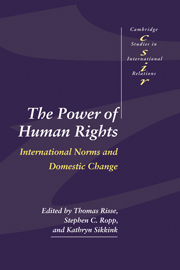Book contents
- Frontmatter
- Contents
- List of contributors
- Preface
- 1 The socialization of international human rights norms into domestic practices: introduction
- 2 Transnational activism and political change in Kenya and Uganda
- 3 The long and winding road: International norms and domestic political change in South Africa
- 4 Changing discourse: transnational advocacy networks in Tunisia and Morocco
- 5 Linking the unlinkable? International norms and nationalism in Indonesia and the Philippines
- 6 International norms and domestic politics in Chile and Guatemala
- 7 The Helsinki accords and political change in Eastern Europe
- 8 International human rights norms and domestic change: conclusions
- List of references
- Index
- Cambridge Cultural Social Studies
7 - The Helsinki accords and political change in Eastern Europe
Published online by Cambridge University Press: 07 December 2009
- Frontmatter
- Contents
- List of contributors
- Preface
- 1 The socialization of international human rights norms into domestic practices: introduction
- 2 Transnational activism and political change in Kenya and Uganda
- 3 The long and winding road: International norms and domestic political change in South Africa
- 4 Changing discourse: transnational advocacy networks in Tunisia and Morocco
- 5 Linking the unlinkable? International norms and nationalism in Indonesia and the Philippines
- 6 International norms and domestic politics in Chile and Guatemala
- 7 The Helsinki accords and political change in Eastern Europe
- 8 International human rights norms and domestic change: conclusions
- List of references
- Index
- Cambridge Cultural Social Studies
Summary
Introduction
The overthrow of repressive Communist regimes across Eastern Europe in 1989 to 1990 represents one of the most significant advances for civil and political rights in the twentieth century. This chapter's interpretation of the demise of Communism focuses on the societal effects of the Helsinki Final Act of 1975, which established human rights as a norm binding on all the states of Europe, and as a legitimate issue in relations between them. The point is not to reduce the complex sources of “1989” to any single cause, but to trace the ways in which international human rights norms, and the transnational activist networks which emerged around them, contributed to this outcome. The Helsinki Final Act's transformation of the normative structure of East – West relations encouraged the mobilization of independent groups, justified transnational networks with sympathetic activists and substate actors in the West, and thereby enabled societal forces in the East to mount unprecedented challenges to regimes which had long monopolized social and political space. Though the depth and duration of this “Helsinki effect” was not equal in all countries of the region, it substantially re-shaped state-society relations throughout the Communist bloc and paved the way for the radical changes of the late 1980s. Beyond their historical significance, the Helsinki cases improve our general understanding of the processes by which the norms of international society transform the identity, interests, and behavior of states (Thomas forthcoming).
- Type
- Chapter
- Information
- The Power of Human RightsInternational Norms and Domestic Change, pp. 205 - 233Publisher: Cambridge University PressPrint publication year: 1999
- 13
- Cited by

